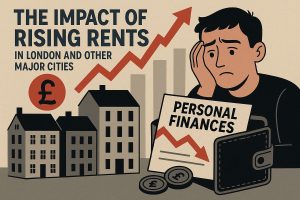Managing multiple debts can be a daunting task, especially when juggling various interest rates, due dates, and repayment amounts. For many, debt consolidation loans offer a seemingly straightforward solution: combining all debts into one manageable payment.
But is this approach truly beneficial, or does it potentially lead to further financial complications? This article explores the nuances of debt consolidation loans, examining how they work, their pros and cons, and alternative options.
What is debt consolidation?

Debt consolidation entails obtaining a new loan to settle multiple existing debts. This approach simplifies the repayment process by combining various debts—such as credit card balances, personal loans, and overdrafts—into a single loan with one monthly installment. The main objective is to make debt management easier, potentially achieving a lower interest rate and better repayment terms along the way.
How do debt consolidation loans work?
Debt consolidation loans are typically personal loans used to pay off existing debts. When you take out a consolidation loan, you receive a lump sum that you then use to pay off your outstanding balances. This results in having only one monthly payment to the new lender. The new loan generally has a fixed interest rate and repayment term, which can provide a clear timeline for when the debt will be fully repaid.
Should i get a debt consolidation loan?
Understanding the benefits
One of the main advantages of a debt consolidation loan is the simplification of payments. Instead of keeping track of multiple payment deadlines and varying interest rates, you only need to manage one payment.
This can significantly reduce the stress and administrative burden associated with debt repayment. Additionally, if you secure a lower interest rate on the consolidation loan compared to your existing debts, you can save money on interest over time. This can help accelerate your journey to becoming debt-free.
Considering the drawbacks
However, debt consolidation is not without its pitfalls. One significant risk is that it involves taking on new debt. Without addressing the underlying reasons that led to the initial debt accumulation, there’s a danger of falling back into old habits and accruing new debts, potentially ending up in a worse financial situation.
Furthermore, while consolidating debt might offer lower monthly payments, this often comes with a longer repayment term. This means you could end up paying more in interest over the life of the loan, despite the lower rate.
Alternatives to debt consolidation loans
Before opting for a debt consolidation loan, it’s worth exploring other options that might be more beneficial depending on your financial situation.
0% balance transfer credit cards
For those with good credit, transferring existing credit card debt to a new card with a 0% introductory interest rate can be an effective strategy. This method allows you to pay off the principal without accruing additional interest during the promotional period. However, discipline is crucial, as failing to pay off the balance before the introductory period ends can result in high-interest rates.
Debt management plans
Another alternative is enrolling in a debt management plan (DMP) through a credit counseling agency. These agencies negotiate with your creditors to reduce interest rates and create a manageable repayment plan. While this won’t reduce the total amount you owe, it can make repayments more affordable and structured.
Debt settlement
For those in severe financial distress, debt settlement might be an option. This involves negotiating with creditors to accept a lump sum payment that is less than the full amount owed. While this can significantly reduce your debt, it can also severely impact your credit score and may come with tax implications.
Evaluating your situation
When considering a debt consolidation loan, it’s crucial to conduct a thorough assessment of your financial situation. Start by calculating your total debt and comparing the interest rates and terms of your current debts with those offered by potential consolidation loans. Using online loan calculators can help you understand the potential savings and costs associated with consolidation.
Moreover, reflect on your spending habits and financial discipline. Debt consolidation can only be effective if it’s accompanied by a commitment to avoiding new debt and managing your finances responsibly. Establishing a budget, cutting unnecessary expenses, and building an emergency fund are essential steps to ensure long-term financial stability.
Debt consolidation loans can be a valuable tool for simplifying debt repayment and potentially reducing interest costs. However, they are not a one-size-fits-all solution and carry risks that must be carefully considered.
Exploring alternatives such as 0% balance transfer credit cards, debt management plans, and debt settlement can provide additional pathways to financial freedom. Ultimately, the success of any debt consolidation strategy hinges on addressing the root causes of debt and maintaining disciplined financial habits.





